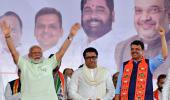'Modi must see how we live, what we have to do to educate our children.'
Jyoti Punwani reports.

They take 'Modi ki guarantees' to the poor, but no one from the PM's party has approached them for votes. They go on strike regularly for their demands and deal with government officers all the time. In fact, earlier this year, Maharashtra Chief Minister Eknath Shinde met them while they were on strike. But no one from his Shiv Sena party has assured them that their grievances will be resolved.
So what do these Lok Sabha elections mean for ASHA workers who work for the government at the grassroots level? "A headache," said Pranita Mhatre, who lives in Chunabhatti, north central Mumbai. "We don't know whom to vote for. We don't like either of the candidates."
Her constituency has the Shinde's Rahul Shewale and the Uddhav Sena's Anil Desai in the contest.
Maalan Dalvi, the most vocal among the group of ASHA workers Jyoti Punwani met at their union office in Thane, had a clear preference: Ex-MP Sanjeev Naik of the BJP. "He is always accessible, and helps us in every way possible, including admissions to school."
Naik was expected to get the ticket from Thane; instead, the Shinde Sena's Naresh Mhaske got it. This led to mass resignations of BJP office bearers in the constituency.
While Naik has asked his supporters to campaign for Mhaske, these women are not ready to support the latter. "We are angry," said Pratiksha Panchal, also from Navi Mumbai.
For Archana Jadhav and Dakshata Mane who live in Vikhroli, north east Mumbai, the criterion for voting was the accessibility of the candidate. In this respect, Uddhav Sena candidate Sanjay Dina Patil, son of former strongman Dina Bama Patil, scored higher than the BJP's Mihir Kotecha.
These ASHA workers have been tasked with checking electoral rolls, getting people to register for postal ballots and going door to door, motivating people to vote. Though this is not meant to be part of their work, they do the last bit with feeling. "We tell people, this is our right given to us by Babasaheb Ambedkar. If you don't vote, you have no right to criticise the government," said Pratiksha Panchal.
***
What is their main demand from the new government at the Centre?
To be treated as regular employees, is the unanimous answer. "Take away this label of swayamsevika please," said Pratiksha Panchal. "Just call us karmacharis, and give us regular salary and pension."
"We are now over 40 years old," said Dakshata Mane. "We can't get any other job."
The ASHA workers' scheme was conceived of as voluntary work by housewives to earn money in their spare time, by acting as a link between the government's health schemes and the general population. When the scheme began in 2005, they were paid Rs 500 by the National Health Mission. The minimum qualification was schooling till Class 5.
"Who but the most desperate would have opted for this work?" asks M A Patil, the man these women credit with whatever gains they have made. He is head of their union, affiliated to the Communist Party of India.
Maharashtra's ASHA workers earn Rs 2,000 from the Centre, and were getting Rs 5,000 from the state till March. After they went on a six-week strike in January, the Maharashtra government raised this to Rs 10,000.
However, they have yet to receive that raise.
"All that we've got since October is Rs 1,600 per month," said Archana Jadhav. The others from Mumbai echoed her complaint. "This is school admission time, we need money," said a worried Dakshata Mane.
Delayed payments are the norm for these women; they often get 3 months' salary at one go, forcing them to take up supplementary work.
Yet, when the medical officer calls them to do their duty as ASHA workers, they must drop everything and run, they said.
"When we joined, we were told we could work in our free time. But now, there is nothing voluntary in our work," said Deepti Mahabal from Navi Mumbai, describing their daily routine.
They must register their attendance in government hospitals every morning, go out to meet beneficiaries of government schemes, then in the afternoon, file reports of their work.
Their work includes going door to door for surveys of women of marriageable age, pregnant and lactating women, children's vaccination, handicapped persons and TB patients. The last includes collecting the sputum of patients.
They have also been at times tasked with checking the number and quality of public toilets, and following up to see why they are not being regularly cleaned. "That's why we say: "Jithe kami, tithey amhi," says Sheetal Brahmane from Chunabhatti in Marathi. "Wherever there's shortage of staff, we are roped in."
Based on what they find, they must enrol women for government health schemes.
Enrollment for these schemes is online, for which they have to use their mobile phones. The allowance they get for recharging their phones however, is only Rs 100 a month. Not only do they need a higher recharge allowance, said Patil, but also better phones.

***
Since they work among the poor, the work these women do is invisible to society at large. However, the COVID-19 pandemic brought them into the limelight.
When everyone was locked indoors, it was they who had to venture out, spreading awareness of preventive measures, handing out sanitisers and masks, and urging people to take the vaccine. "We know how much we had to persuade people to take the vaccine. Now Modi brags about it as if he discovered it," said Pratiksha. "Is he a scientist?"
The bitter taste left after doing all this still lingers. Ostracised by their families because they mingled with everyone at a time of social distancing, they were reluctantly allowed to enter their own homes and were kept away from their children.
Many of them became the sole earning members of their family as their husbands were laid off during the pandemic.
Maalan lost her husband to Covid. "He got it from me, and I got it because of my work as an ASHA worker," she said angrily. "But the government refused to give him compensation."
She wasn't even paid for the two months that she missed work after she got Covid. "We were doing government work, shouldn't we have been treated like other government employees?"

***
These women take government schemes to others, but do they themselves benefit from them?
All of them get the 5 kg rations that the PM talks about, however, they are not impressed with the quality of the foodgrains. Nor do they think this is enough.
"Modi must see how we live, what we have to do to educate our children. They need scholarships and jobs. Can we survive only on rations?" they asked.
"I've educated my children by working as a domestic," said Ujwala Chowdhury from Navi Mumbai proudly, while another said she had to resort to providing dabbas for workers.
They don't qualify for other schemes such as Jan Dhan accounts or the PM Awas Yojna. Nor do they get house loans because they can offer no collateral.
Are the government schemes for which they enrol beneficiaries implemented?
All of them replied that they got calls all the time from those they have enrolled. "The commonest complaint is that no money has come to them, though we enrolled them more than a year ago."

***
Given their working conditions, it is hardly surprising that the women aren't too familiar with the candidates who will represent them in Parliament. "We don't even get time to watch the news," said Dakshata.
Interestingly, there was a clear divide between the ASHA workers from Mumbai and those from Navi Mumbai. Unlike the former, the latter had got their salaries; they had even got a bonus for Diwali.
It was obvious that the Navi Mumbai unit were better off because they had a tough fighter leading them: Maalan Dalvi. "I've learnt to fight from him," she said, pointing at M A Patil.
Maharashtra's ASHA workers are the highest paid, says Patil proudly. That's because of their history of struggle, of going on strike even if it means loss of salary. This history has brought about a change in the way they are treated by those they report to, like nurses and doctors in government hospitals, he said.
"Earlier, they'd be told ''Ey, ikdey ye (Hey you, come here). Now that can no longer happen. They can fight with the medical officer, with officials from the health department. That is the most important change," said Patil.
It seems that only this determination to fight for their rights will finally help them, not the MPs representing them.
Feature Presentation: Aslam Hunani/Rediff.com










